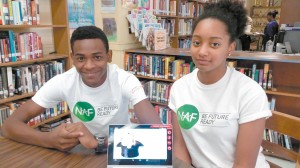Warren Easton students make the grade in ingenuity
23rd November 2015 · 0 Comments
By Eric Craig
Contributing Writer
A woman’s make-up guide, a shoe-tie guide for children, and a celebrity fashion app for Androids. These are all ideas of ambitious high school students at one of New Orleans’ oldest public high schools.
This school year, students at Warren Easton Charter High School began learning how to develop and market their own android applications. The school is the only one in the state selected by the Lenovo Scholars Network among National Academy Foundation (NAF) schools.

Warren Easton students, Antoine Philips and Taylor Simien show of their “Magic Hat” App they created as participants in the Lenovo Scholars Network.
“This is great for our students. When you have skills you can take away with you, like making an Android app, it’s a phenomenal opportunity,” said Kim Henry, who has been teaching engineering and math at Warren Easton for two years, and who successfully applied for the 2015-16 academic Lenovo Scholar Network grant.
The Lenovo Scholars Network partners with the NAF and the Center for Mobile Learning at the Massachusetts Institute of Technology. The program encourages mobile application development by underserved high school students. The Lenovo Scholars Network grant supplies Lenovo PCs and Lenovo android tablets to students participating in the program. The students then develop applications using MIT’s learning program.
The high school, which is part of the National Academy Foundation, belongs to a consortium of academies across the United States. The Foundation is present in 21 of the 25 largest school districts, consisting of over 667 academies and over 80,000 students. The NAF is designed to offer curriculum and resources to prepare students for college and work after high school. The Foundation also has special resources, such as tailored curriculum and mentorship opportunities, for engineering programs.
Warren Easton started its engineering academy in 2012. The first cohort of 22 students will graduate in 2016. The academy currently has a total of 73 participating students. The program is certified by the NAF, and offers four engineering courses: introduction to engineering, engineering design, principles of engineering and robotics.
Henry, who was a professional engineer for 30 years, coordinates the mobile app development component within the academy of engineering.
“When I found out we won the grant, I was excited,” Henry said. “Coding is not going away, so I thought this grant would be a good for our students,” she added.
Currently the academy has six teams of students that are developing applications. As part of the Lenovo Scholars Network, which is entering its second year of operation, the students are required to propose and create an app, and create a plan to put the application on the market. The students will then participate in a national competition for the best application and market plan. This year the competition will be held in Orlando, Fla., and will include 20 different NAF academies.
“We have been coming up with at least three ideas for what we would like to see in our apps,” said Taylor Simien, a junior in the engineering academy. The students have currently developed three applications in their introduction to engineering course. These apps include a magic 8-ball, a magic hat, and a painting application.
“I try to get them to see from a real-world perspective of how fortunate they are,” Henry said. “I didn’t get engineering courses when I was in high school. Even to know the lingo, to know the terminology of the trade is huge if you get it young,” she added.
The students said they are more energized than ever to create more mobile applications. “I wish we could get more class time with app development. That way we can really get into the subject and learn how to build on our own,” said Antoine Philips, a junior in the engineering academy.
“The trick is to get the students to think holistically,” Henry said. “What problem are you solving with this app? You can’t just create an app to create an app. The problem doesn’t have to be world peace, but it has to be a solution somebody wants. When they started getting in that way of thinking, they started coming up with some really good apps,” Henry said.
This article originally published in the November 23, 2015 print edition of The Louisiana Weekly newspaper.



